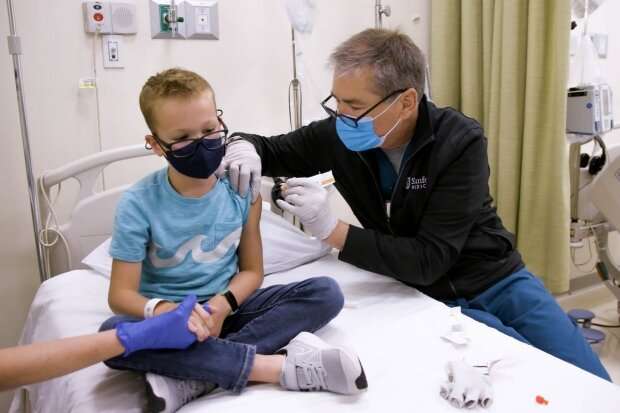Pediatricians answer questions about COVID-19 vaccines for kids aged 5–11

On Nov. 2, the Centers for Disease Control and Prevention recommended that COVID-19 vaccinations be given to children as young as 5. Pediatricians' offices, pharmacies and health systems are preparing to offer the Pfizer-BioNTech vaccines to children across the country.
Science writer Erin Digitale turned to Stanford professors and pediatric infectious disease experts Yvonne Maldonado, MD, and Grace Lee, MD, for answers to parents' frequently asked questions about the vaccines. Maldonado leads Stanford's involvement in the pediatric clinical trials of the Pfizer-BioNTech COVID-19 vaccine. Lee chairs the CDC Advisory Committee on Immunization Practices, which advises the CDC on vaccine use and safety.
Q. Why should my child be vaccinated for COVID-19?
Children need the protection offered by vaccination. More than 6 million children in the United States have been infected with the SARS-CoV-2 virus since the beginning of the pandemic. Some have become severely ill and even died from complications of COVID-19.
In addition to its direct effects on their health, the pandemic has disrupted children's education, friendships and relationships with extended family. Vaccines will make it safer for kids to take part in many activities that are important to their well-being and growth, including attending school and spending time with loved ones.
Children are a large segment of the population. Vaccinating them will help control the virus and help prevent the development of new viral variants.
Q. How is COVID-19 vaccination different for children younger than 12?
Children aged 5–11 will receive a smaller dose of the Pfizer-BioNTech vaccine, using smaller needles. The dose for these children is 10 micrograms, one-third of that used in teens and adults. Children's immune systems are more responsive than those of adults and in clinical trials, the smaller dose was found to produce a robust immune response.
Children will receive two doses of the Pfizer-BioNTech vaccine spaced three weeks apart, the same timing as for older age groups.
Vaccine trials for children younger than 5, using even smaller doses, are ongoing. Pfizer representatives have said they expect to report results for the youngest children before the end of this year. The Food and Drug Administration and the CDC will then consider the results, with possible authorization for young children in early 2022.
Q. How do we know that the vaccine is safe and effective for children?
The Pfizer-BioNTech vaccine was studied in a clinical trial of more than 2,200 children aged five to 11, including about 150 children at Stanford. The trial followed the same process as clinical trials used for all other childhood vaccines.
In the trial, COVID-19 vaccination produced a similar immune response to that seen in clinical trials in adults. The vaccine was 90.7% effective in preventing symptomatic COVID-19 infection in children.
Children in the trial had only mild to moderate side effects that resolved in a few days. The side effects included redness and swelling, fatigue, headache, muscle and/or joint pain, chills, fever, swollen lymph nodes, nausea and decreased appetite. These side effects are consistent with the body's normal reactions to vaccination and indicate that the immune system is doing its job. Side effects in the heart, which have been observed in some adolescent boys who received the vaccine, were not seen in children younger than 12.
The side effects of vaccination are much less severe than the range of symptoms with COVID-19 infection. Although most children with COVID-19 have mild illness, thousands across the country have been hospitalized, and hundreds have died. Getting vaccinated is much safer than getting sick with COVID-19.
Clinical trials in children of the Moderna COVID-19 vaccine are underway.
Q. How can I schedule a COVID-19 vaccination for my child?
Pediatricians' practices across the country have been planning for several weeks to make vaccines quickly available. Contact your child's pediatrician for an appointment.
Parents can also schedule their child for a vaccine appointment through Stanford Children's Health at COVIDvaccine.stanfordchildrens.org , or check for appointments in their community through the California Department of Public Health at myturn.ca.gov/.
If your child has not yet received a flu shot this year, the COVID-19 vaccine can be given at the same time as any other childhood vaccine, including the flu vaccine. Flu vaccination is recommended for everyone older than six months of age.
Q. After receiving their vaccines, will children still need to take precautions to prevent viral spread at school?
While the vaccinations are very effective, especially for preventing severe COVID-19, they do not provide perfect protection.
Until the pandemic is broadly controlled, we need to use all available tools to reduce viral spread in schools and other public settings, including vaccinating everyone who is eligible to receive the vaccine, mask-wearing indoors for everyone older than two and in some cases outdoors as well, hand hygiene, physical distancing, improving ventilation in schools when possible, and other mitigation measures.
Reducing viral spread keeps our communities healthy and gives the virus fewer opportunities to mutate in ways that result in dangerous new variants.




















